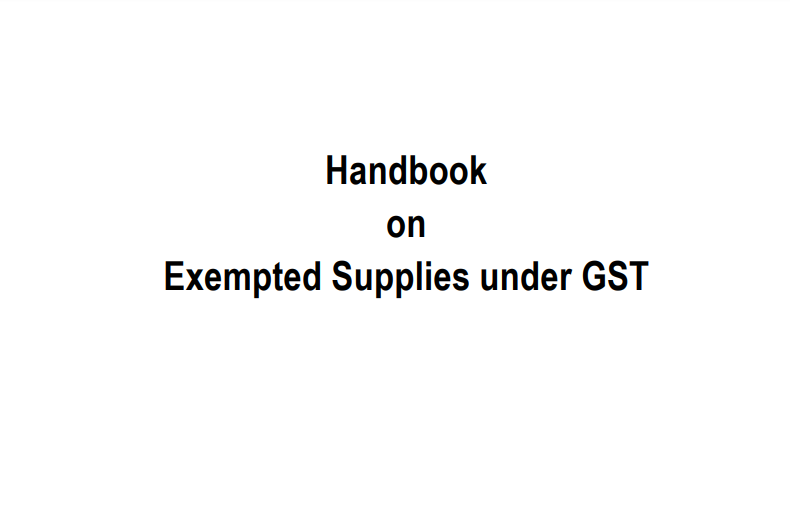Handbook on Exempted Supplies under GST: ICAI
Table of Contents
Chapter I Background of Exemption
1. Introduction to Exemptions
The word exemption as commonly understood means a privilege. It can also mean freedom from fetters. According to P Ramanatha Aiyar’s Law Lexicon (Fourth Edition as Revised by Shri. Shakil Ahmad Khan), the word “exempt” means putting a person beyond the application of the law. It further says that when the word exempt or an exemption is used in taxation parlance it means – (i) precluding from being chargeable and (ii) immune from liability, obligation or penalty. Exemption and non-liability are normally different from each other. For instance, while computing the gross turnover:-
(a) exempted turnovers are includible in gross turnovers and thereafter subject to a deduction, and
(b) in case of non-liability the question of inclusion in gross turnovers does not arise.
A levy or charge to tax is imposed by a taxing statute. The very same statute could also provide for exemption. Over the last 2 to 3 decades the word exemption has been colloquially used in taxing statutes in many ways – for example – Non-Taxable, Negative list, ‘NIL rated’ etc. It is common for people to understand that zero-rate means exempt which is incorrect. An exemption may also be understood by some as a situation when a statute provides for certain thresholds before the taxability arises. Many a time, the taxpayers confuse concessional rates with exemptions.
Normally, it is the State and/or the Central Government (or inappropriate cases Union Territories) which grant exemptions. Such, exemption can be – granted (i) conditionally (ii) generally (iii) through Government orders (iv) under special circumstances (v) through notifications (vi) by way of circulars (vii) by way of tax holidays (viii) to specific class (or kind) of goods and/or services (ix) to specific class of persons (x) for a specific time frame or with a cap on value (xi) to specified transactions, etc. It can also be granted in any of the said combinations since it is the prerogative of the Government.
Exemption provisions or rules ought to be enacted/administered and also read strictly. In case of any ambiguity, the intention of the Legislature ought to be strictly borne in mind and given effect to. Generally, the language employed in the construction of an exemption statute must be (i) unambiguous (ii) clear (iii) strictly interpreted (iv) within the powers of the legislating / issuing authority and (v) cater to the intent of the legislature, etc.
Exemptions could be granted prospectively, or in certain situations/circumstances retrospectively. Any such enactment must be within the Constitutional framework while bearing in mind the Legislative delegation. Referential legislations in respect of grant of exemptions must be generally avoided considering their complexity. Exemptions that commence during a year must be so enacted to take care of “pipeline transactions”. Exemptions with sunset clauses must be properly framed. The GST laws also provide for exemptions. This booklet discusses several aspects of such exemptions.
2. A brief history of exemptions under the erstwhile laws
It is important to understand the scheme of taxation of the Government (State or Central) to understand the nuances of exemptions. Normally, goods and/or services relating to traditional, social and economic importance, daily needs/necessities and Government policies qualify for the exemption. For example, under the Service Tax Regulations while clinical services and education services found favour for grant of exemption, many of the State Governments may have been granted exemption in respect of the sale of life-saving drugs or books meant for reading. Similarly, many States may have granted exemptions in respect of the sale of food grains while agricultural services stood exempted.
The Constitution itself provided safeguards from the levy in respect of certain goods/services from the wrath of taxation like for instance Electricity, Newspapers etc. Apart from the nature of exemptions cited in the introductory part of this Booklet, broadly, exemptions (among others) granted by the State or Centre under the erstwhile laws could be traced to the following :
(a) Public interest or general public good.
(b) Goods of traditional, social and cultural importance, daily needs, etc.
(c) Growth of a particular class or kind of industry in a particular area in a State or Union Territory.
(d) Development of a State / Union Territory resulted in trade wars and grant of exemptions.
(e) Objectives or policies of a State / Union Territory resulted in the grant of exemptions.
(f) Imports of goods and / or services were granted exemptions to make exports competitive thereby resulting in foreign exchange earnings.
Exemptions were also granted to several classes of goods and / or services bearing in mind trade compulsions between Countries.
Under the erstwhile laws, exemptions provided were the subject matter of several rounds of litigations. This is because the statute (among other factors/issues) was:
(i) ambiguous and there did not exist clarity;
(ii) not properly drafted resulting in classification issues;
(iii) so understood that the essence or intent of the legislature was not captured correctly;
(iv) so understood by either party that resulted in incorrect interpretation or grant of exemptions;
Download the copy:
 ConsultEase Administrator
ConsultEase Administrator
Consultant
Faridabad, India
As a Consultease Administrator, I'm responsible for the smooth administration of our portal. Reach out to me in case you need help.









